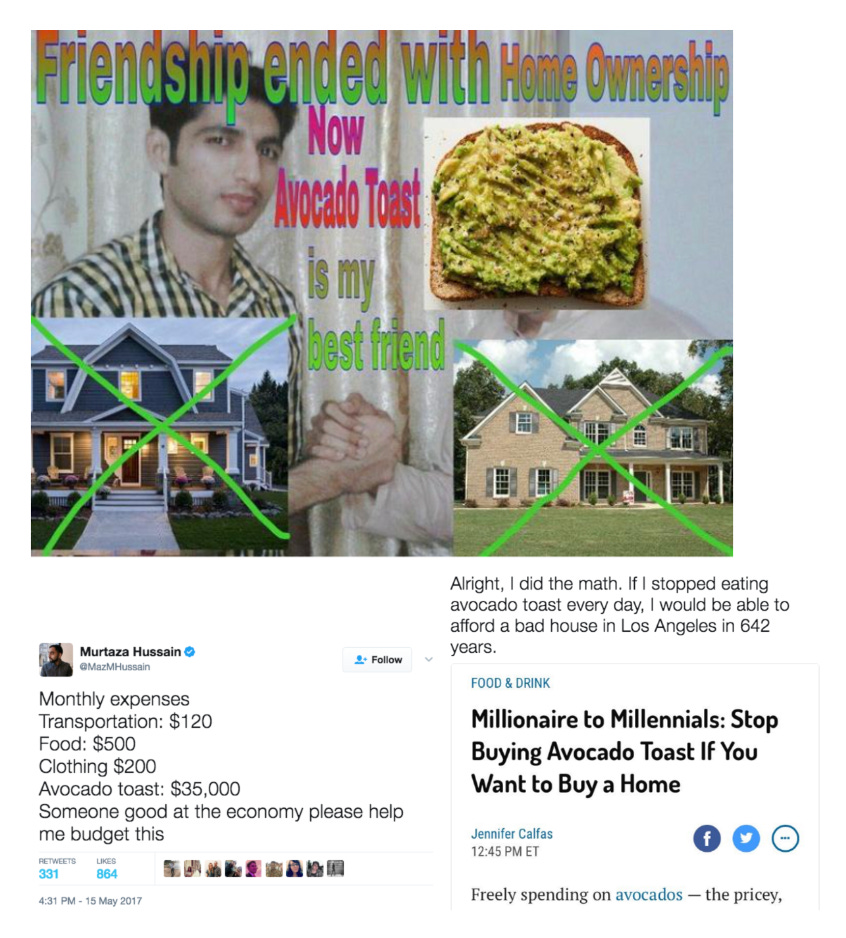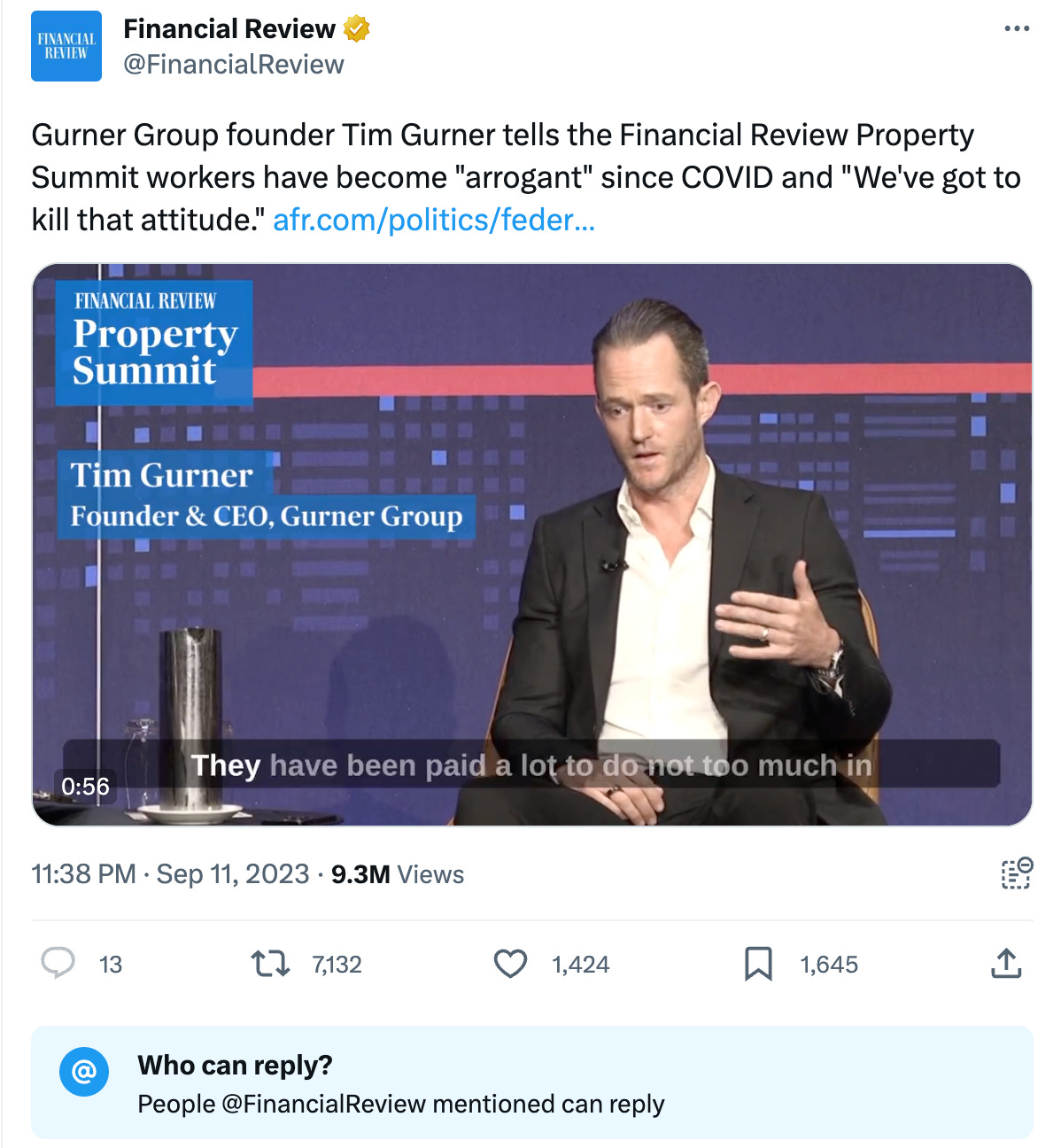The dismal return of the avocado toast guy
The two viral moments of an Australian property developer
Like many, I remember exactly where I was when I learned what happened in 2017. At a small coffee shop called Porter, inside a disused train station in Madison, Wisconsin. Coincidentally, they had great avocado toast. I may have been eating that toast when I first encountered Tim Gurner.
This was perfect social media catnip. Someone says something very stupid from a position of privilege. Also, as many noted, Gurner had a very punchable face. The memes flowed.
Pre-Musk twitter was good at a couple of things. One was providing a single space where people could simultaneously focus on national or international events as they happened. One of the last times we saw that energy was the Oscars when Will Smith smacked Chris Rock.
Twitter was also good at creating those collective moments, turning dross like some idiotic comment from a rich dude into priceless entertainment.
Avocado toast became a meme, and we all had a good laugh together. Most people forgot Tim Gurner, if they paid attention to him at all.
Until this week. When I checked in on twitter today, I saw post after post about some pretty outrageous things a CEO/developer had said at an The Australian Financial Review Property Summit, an event hosted by Financial Review, which seems to be a sort of Forbes for Aussies.
As you can see, Financial Review quickly restricted the replies, but they could not stop the quote tweets.
Here is exactly what Gurner said in the clip and his extended comments are here:
People decided they didn't really want to work so much through Covid and that has had a massive issue on productivity. Tradies [tradespeople] have definitely pulled back on productivity. They have been paid a lot to do not too much in the last few years, and we need to see that change. We need to see unemployment rise. Unemployment has to jump 40, 50 percent in my view. We need to see pain in the economy. We need to remind people that they work for the employer, not the other way around. There's been a systematic change where employees feel the employer is extremely lucky to have them, as opposed to the other way around. It’s a dynamic that has to change. We've got to kill that attitude and that has to come through hurting the economy. Which is what the whole global - you, know - the world is trying to do. Governments around the world are trying to increase unemployment to get that to some sort of normality. And we’re seeing it. I think every employer now is seeing it. I mean there is definitely massive layoffs going off. People might not be talking about it but people are definitely laying people off and we're starting to see less arrogance in the employment market, and that has to continue because that will cascade across the cost balance.
Even if you agree with the specific mechanisms Gurner is discussing, the open disdain for employees, and the determination to impose pain on the laboring class is borderline sociopathic.
Reaction was swift, and, uh, not complimentary.
For many, Gurner was simply saying out loud what they suspected the capitalist class thought or said in private. After all, central bankers have also argued for the need to increase unemployment to curb inflation.
My response was yes, that, but also: I would recognize that giant forehead and protruding ear combo, unwisely accentuated through slicked back hair, anywhere.
The avocado toast guy has returned! Why can’t anyone see that its the avocado toast guy? He is risen!
I confess to have been initially delighted for the return of Gurner. It was like a scenery-chewing villain had unexpectedly come back to life, twirling his mustache. But transcribing his comments above drained any sense of joy. You might have convinced yourself that 2017 Gurner was some out-of-touch jackass, but this was someone who went on stage to speak to peers and demand that employers and government break the working class, the people who had built his developments, from the belief that they deserved anything better.
The more you learn about Gurner, the more awful he seems. His wealth is estimated to be in the several hundreds of millions of dollars. He is into wellness, via biohacking and luxury spa treatments, which, of course, he is also selling at his private, anti-aging club.
Gurner seems not just like someone who is indifferent to the well-being of other people, but who would be someone you would hate to get stuck chatting to. In the greater scheme of things, he is just a wealthy Australian developer, with a penchant for self-publicity, which he may figure helps his business. It has worked for others after all, including Donald Trump. He is not especially important except as a cipher for various things: a certain type of infamy, the nature of social media that creates it, and an antagonism between the very wealthy and those who work for a wage.
For a while, twitter felt like it once did. People collectively clambered on this viral moment. But whereas the avocado toast moment was leavened by its inherent ridiculousness, this felt grimmer. There was much to mock, but little to laugh at. Gurner’s comments were not just pompous, but gleeful in their embrace of human misery. In this, Gurner represents the anthesis of the old Marxian adage that history repeats itself, first as farce, second as tragedy. Gurner began as farce, and returned, if not as tragedy, then embodying some of the darker currents of our time.








